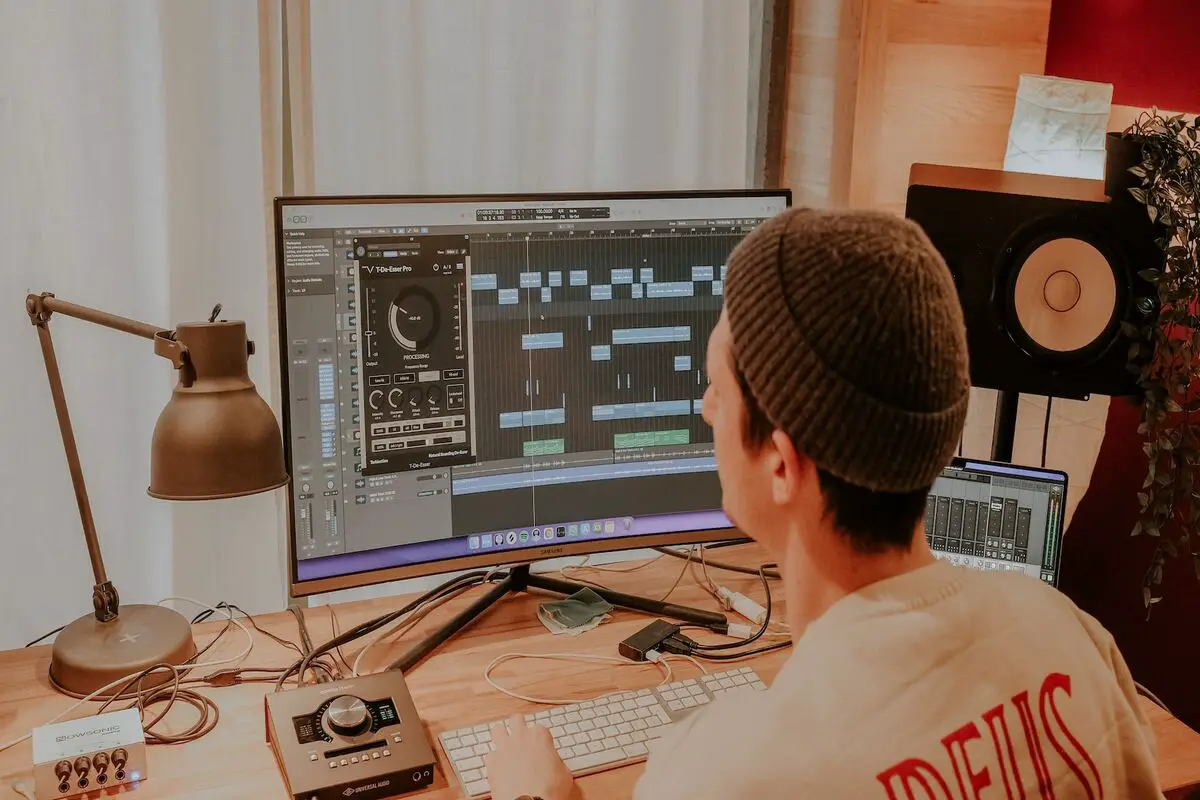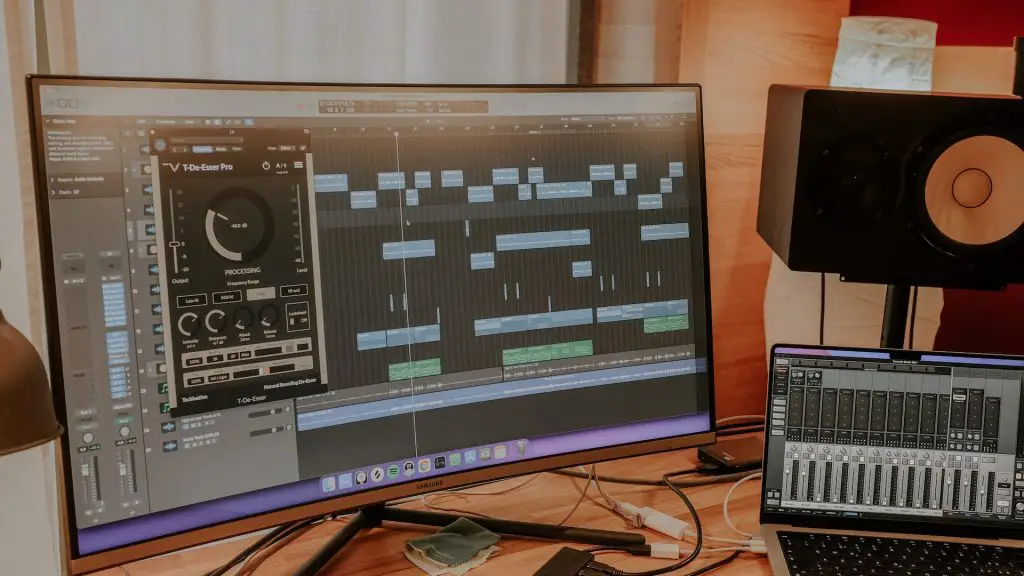So there I was, cranking out beats like it was my job (because, well, it is). My track was like a ship lost at sea; it was just missing… something. I was stumped until something cruised in like a wave and handed me a life preserver—my first audio plug-in. And just like that, my track went from being a rickety old sailboat to a top-of-the-line yacht. Now, you might be thinking, what’s a plug-in in audio? Well, let’s break it down without missing a beat!
What is a plug-in in audio? An audio plug-in is a software addition that works within your digital audio workstation (DAW) to enhance sound, add effects, or improve audio quality, essentially serving as a tool to tweak and fine-tune your music production.
What exactly is a plug-in used for in audio production?
An audio plug-in, in the simplest terms, is a small piece of software that adds or enhances features in your digital audio workstation (DAW). Think of it as a mini app within your music software. It’s like adding a turbocharger to your car engine; it’s not necessary to run, but it surely boosts performance.

For example, you might have a basic synthesizer plug-in that generates electronic sounds or an effect plug-in like reverb or distortion that tweaks the sound in some way. It’s like having an entire sound engineer’s toolbox at your fingertips. You can shape your sound, layer effects, and truly make your music your own.
Did I mention something about effects earlier? Yeah, I did. But it’s worth repeating because effects are the heartbeat of any great track. They can make the difference between a flat, lifeless sound and a track that pops and sizzles.
Now, picture this: I was just starting out as a music producer. My tracks were alright, but they lacked that extra oomph, that magic touch. Then, I discovered my first plug-in, a simple reverb. I was playing around with a track I was working on, and I added some reverb to the snare drum. And bam! It was like I had opened up a whole new world of sound. The snare drum echoed and resonated, giving the track a depth it was previously missing. That’s the power of a plug-in, my friends.
AKAI Professional MPK Mini MK3

AKAI Professional MPK Mini MK3
Why are plug-ins important?
Plug-ins are like the secret spice that turns a bland dish into a flavorful feast. Here’s why you should care about them:
- Unleash your creativity: Plug-ins open up a world of sonic possibilities, allowing you to experiment, shape, and mold your sound exactly the way you envision it.
- Professional sound at your fingertips: With plug-ins, you can achieve that polished, radio-ready sound that grabs listeners’ attention and keeps them coming back for more.
- Affordability: Compared to expensive outboard gear, plug-ins provide an affordable alternative without sacrificing quality. You can access a vast range of virtual instruments and effects without breaking the bank.
- Efficiency and flexibility: With plug-ins, you have instant access to a wide array of sounds and effects within your DAW, eliminating the need for additional physical equipment or complex routing setups.
- Stay current and up-to-date: Plug-in developers are constantly innovating, releasing new tools, updates, and advancements. By embracing plug-ins, you ensure that your music production stays on the cutting edge.

How do plug-ins transform your music production?
Ready to take your music production game to the next level? Here are some ways in which plug-ins can be a game-changer for your tracks:
1. Unleash a universe of sounds
With virtual instrument plug-ins, you can access an entire orchestra, a myriad of synthesizers, and unique sounds that would require an entire studio full of gear.
2. Shape and sculpt your sound
EQ and compression plug-ins allow you to fine-tune your audio, enhance clarity, and create a balanced mix that keeps your listeners engaged.
3. Create mind-blowing effects
From lush reverbs to psychedelic delays, plug-ins like reverb, delay, and modulation effects add depth, space, and character to your tracks.
4. Bring vocals to life
Vocal processing plug-ins offer a toolbox of tools to polish vocals, including pitch correction, harmonies, and creative effects to make your voice soar.
5. Master the art of mixing and mastering
Plug-ins for mixing and mastering give you control over the final polish, ensuring your tracks sound professional and ready for the world to hear.
Here are some dos and don’ts when using plug-ins in your audio production:
| Dos | Don’ts |
|---|---|
| Do explore different plug-ins and experiment | Don’t rely solely on plug-ins for creativity |
| Do learn and understand the parameters and controls | Don’t overuse effects, maintain balance |
| Do save and organize your favorite plug-in presets | Don’t underestimate the importance of sound selection |
| Don’t let plug-ins become a crutch; focus on honing your skills | Don’t overuse effects; maintain balance |
What are the different types of plug-ins?
When it comes to plug-ins, variety is the spice of life. Let’s explore the different types of plug-ins that can take your music production to new heights. Get ready to expand your sonic toolkit!
1. Virtual instruments
These plug-ins emulate real instruments, allowing you to play and record them using MIDI controllers. From pianos and guitars to synthesizers and drums, you can access an entire orchestra or create otherworldly sounds.
2. Effects plug-ins
Effects plug-ins are like seasoning that adds flavor to your tracks. They shape and modify your sound, creating ambiance, textures, and spatial effects. From reverbs and delays to compressors and equalizers, these plug-ins offer endless sonic possibilities.
3. Utility plug-ins
Utility plug-ins are the Swiss Army knives of your production process. They provide essential functions like metering and signal routing and gain control to ensure your tracks are balanced, cohesive, and sound their best.
4. Mixing and mastering plug-ins
These plug-ins are your secret weapons for achieving professional-grade mixes and masters. They offer precise control over dynamics, stereo imaging, equalization, and more, helping you create a polished and cohesive final product.
5. Analysis and measurement plug-ins
These handy tools provide valuable insights into your audio. They help you visualize frequencies, analyze audio signals, and ensure your tracks meet industry standards for loudness and dynamic range.
Where can you find quality plug-ins?
Ah, the quest for quality plug-ins! Let’s explore some reliable sources where you can discover the finest tools to fuel your sonic endeavors.
1. Official developer websites
One of the most trustworthy places to find high-quality plug-ins is directly from the developers themselves. Visit their official websites to explore their offerings, demo versions, and purchase options. Some renowned plug-in developers include Waves, Native Instruments, and FabFilter.
2. Online marketplaces
Online marketplaces provide a bustling hub where you can find a plethora of plug-ins from various developers, all in one place. Platforms like Plugin Boutique, Splice, and KVR Audio offer a wide range of plug-ins, often with user reviews and ratings to help inform your choices.
3. Music production communities
Engaging with fellow music producers in online communities can be an excellent way to discover hidden gems and recommendations for plug-ins. Platforms like Reddit’s r/WeAreTheMusicMakers, Gearspace, and various Facebook groups foster a supportive community where producers share their experiences and suggestions.
Many developers offer free versions of their plug-ins, allowing you to explore their capabilities and decide if they align with your needs.
4. Free plug-ins
Don’t overlook the power of free plug-ins! Many developers offer free versions of their plug-ins, allowing you to explore their capabilities and decide if they align with your needs. Websites like Plugin Alliance, Spitfire Audio, and VST4Free curate collections of free plug-ins for you to dive into.
5. Industry publications and reviews
Keep an eye on industry publications and trusted review websites for expert opinions and insights on the latest plug-ins. Magazines like Sound on Sound and online platforms such as MusicRadar and Ask.Audio often provide detailed reviews, comparisons, and recommendations to help you make informed decisions.
Advantages and disadvantages of using plug-ins
Audio plug-ins are powerful tools used by musicians, producers, and audio engineers to enhance and manipulate sound in various ways. These software add-ons offer a wide range of features and functionalities, but they also come with their own set of advantages and disadvantages.
Advantages of plug-ins
Audio plug-ins have several advantages that make them invaluable in the world of music production and sound engineering. Here are some of the key benefits:
- Sonic Versatility: Plug-ins offer a vast range of sounds, effects, and instruments, providing producers with a limitless sonic palette to explore.
- Affordability: Compared to physical hardware, plug-ins are often more cost-effective, making high-quality tools accessible to a wider range of producers.
- Efficiency and Convenience: With plug-ins, everything is within your digital audio workstation (DAW), eliminating the need for external equipment and streamlining your workflow.
- Flexibility and Experimentation: Plug-ins enable quick adjustments and experimentation, allowing producers to explore different creative possibilities and make real-time changes to their sounds.
- Expert Presets and Automation: Many plug-ins come with expertly crafted presets and automation features, making it easier for beginners to achieve professional-level results.
Disadvantages of plug-ins
While audio plug-ins provide numerous advantages, there are a few drawbacks to consider as well:
- Learning Curve: Mastering plug-ins can be challenging for newcomers, requiring time and effort to understand their parameters and controls fully.
- CPU Intensive: Some plug-ins demand significant processing power, potentially straining your computer’s resources and leading to performance issues.
- Dependency on Technology: Relying heavily on plug-ins can make producers reliant on specific software and systems, limiting compatibility and flexibility in certain situations.
- Potential for Overuse: It’s essential to exercise restraint when using plug-ins, as excessive effects or processing can result in an overcrowded mix or artificial-sounding music.
- Variability in Quality: Not all plug-ins are created equal. It’s crucial to research and choose reputable brands to ensure high-quality sound and reliable performance.
Understanding the advantages and disadvantages of audio plugins can help individuals make informed decisions when incorporating them into their music production or sound engineering processes. By weighing these factors, you can maximize the benefits while mitigating potential challenges.
If you want even more tips and insights, watch this video called “What is a Plugin?” from the Audible Genius YouTube channel.
Frequently asked questions (FAQ)
Do you still have questions about what a plug-in in audio is? Below are some of the most commonly asked questions.
What are some popular virtual instrument plug-ins for music production?
Some popular virtual instrument plug-ins in the music production world include Native Instruments Kontakt, Spectrasonics Omnisphere, and Arturia V Collection. These plug-ins offer a wide range of realistic instrument sounds, expansive libraries, and versatile features to inspire your creativity.
Can I use plug-ins with any digital audio workstation (DAW)?
Yes, most plug-ins are designed to be compatible with various DAWs. However, it’s always essential to check the specifications and system requirements of the plug-in to ensure it is compatible with your specific DAW version and operating system.
Are there any free plug-ins available for music production?
Absolutely! Many developers offer free plug-ins that can be a great starting point for beginners or budget-conscious producers. Websites like Spitfire Audio Labs, Valhalla DSP, and Tokyo Dawn Labs provide excellent free plug-ins that can add value to your productions without breaking the bank.
Conclusion
And there you have it. We’ve dived into the world of plug-ins. From virtual instruments to effects, utility to mixing and mastering, and analysis and measurement, plug-ins are the secret sauce that elevates our music production game. Keep exploring, experimenting, and refining your sound to create music that truly resonates with your audience.
I read and reply to every comment, so let me know in the comments section below if you have any questions or thoughts. If you found this article helpful, don’t forget to share it with your fellow music lovers. And for more tips and tricks on mastering the art of music production, be sure to check out my full blog. Thanks for reading, and keep grooving to the rhythm of your own music!
Key takeaways
This article covered plug-ins in music production, exploring their various types and their impact on sound creation. Here are some key takeaways:
- Plug-ins come in different types, including virtual instruments, effects, utility, mixing & mastering, and analysis & measurement.
- Virtual instruments provide a wide range of sounds and instruments while effects shape and modify the audio.
- Utility plug-ins offer essential functions, and mixing & mastering plug-ins refine the final mix.
- Analysis and measurement plug-ins provide valuable insights into audio signals.
- Quality plug-ins can be found on official developer websites, online marketplaces, music production communities, and through industry publications.
- Using plug-ins offers sonic versatility, affordability, efficiency, and creative potential.
- Mastering plug-ins require a learning curve, and there is a dependency on technology.
- It’s important to avoid overusing plug-ins and choose reputable brands for quality assurance.















